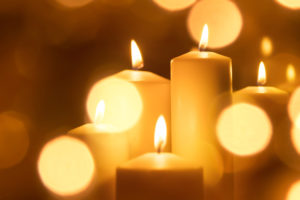Looking up at the stars on a warm, quiet night is one of my favorite things to do. I revel in the chance to soak in the vastness around me, staring at the charming character of stars that are so massive and powerful in existence but seem so tiny to my eyes. I remember driving through the jungles of Honduras at night in the back of a pickup once in college. The sweet-smelling dirt swirled around me, the bump and thud of the truck hitting mud hummed under my feet, and I looked up. It was simply pure beauty. There were no lights from cities or towns to adulterate the sky. Miles of mountain villages and the deep Caribbean Ocean spilled darkness to everything around us. I couldn’t make out a tree in front of me if it weren’t for the headlights. Because of the impenetrable darkness, the stars sprinkled about the night sky became alive. Each one was more beautiful than the one next to it. There seemed to be thousands more than I had ever seen before.
 The readings this Sunday remind me of this paradox — that within some of the darkest parts of our history, the light of Christ has shone even more brilliantly. Tertullian observed the same when he said that “the blood of martyrs is the seed of the Church.” Some of the most trying times in the history of the Church brought about the greatest saints who were willing to die for the faith. Those lights in the darkness allowed the Church to flourish. This reminds us that no matter how dark the world seems to get around us, the light of Christ shines even brighter, leading his people to healing and hope.
The readings this Sunday remind me of this paradox — that within some of the darkest parts of our history, the light of Christ has shone even more brilliantly. Tertullian observed the same when he said that “the blood of martyrs is the seed of the Church.” Some of the most trying times in the history of the Church brought about the greatest saints who were willing to die for the faith. Those lights in the darkness allowed the Church to flourish. This reminds us that no matter how dark the world seems to get around us, the light of Christ shines even brighter, leading his people to healing and hope.
As I look around at our world today, I see this darkness. I see a darkening of intellect and will when celebrities like Michelle Williams publicly praise abortion and twist the truth of freedom to be self-serving. I see a darkening of hope when the world sits on the precipice of war. I see darkness when friends lose hope of ever being able to afford to pay bills and provide for their children. How are we to respond to the enveloping darkness around us? How do the readings this weekend teach us to respond?
In the second reading, St. Paul attempts to show us the answer. He chastises the Corinthians to avoid divisions and rivalries among them. While we aren’t arguing who is a follower of Paul or Apollos in our times, we can see the divisions we’ve allowed to take root in our lives in a similar way. We hear things like “I’m a Trump supporter!” or “I will never vote Republican!” and more. The point Paul makes is that to combat the darkness, we need to follow the light. In other words, our lives must be entirely Christ centered, or Christocentric. Our primary identity must lie in belonging to Christ. Everything else must become secondary.
In the Gospel, Christ beckons the first Apostles to follow that primacy and light. The darkness they experienced in their day may have been in the context of different circumstances than we are in, but it wasn’t completely unlike our own. Jesus spoke to the darkness surrounding the Apostles spiritually and answered it with the call to follow him. The challenge for us today is to be deeply convicted of that same call and to recognize that Christ is reaching into the impenetrable depths and darkness of our own hearts and cultures and calling us to follow him in a new, profound way. After this, we need to follow the example of the Apostles and act on it. We need to answer the question, “What is God calling me to let go of so that I will be freer to live a life for Christ?”
In one of his sermons, St. Bernard says that “the incarnation teaches us how much God cares for us and what he thinks and feels about us.” Like the brilliance of the stars I experienced in that dark drive in Honduras, when we truly accept that Christ loves us and is calling us “out of darkness and into his marvelous light,” we can stop fearing the darkness and division around us (1 Peter 2:9).
Angie Windnagle, BSC is an author for Liturgical Publications, Inc. and writes reflections on the Sunday readings.